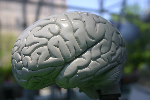 There are times when it's not easy to come up with an effective image for a particular mnemonic. You may not realize it, but you have a great tool right in front of you for finding them.
There are times when it's not easy to come up with an effective image for a particular mnemonic. You may not realize it, but you have a great tool right in front of you for finding them.
As an example of what I'm talking about, let's say you're trying to learn a foreign language. As I mentioned in my foreign language post just under a year ago, I've found these language-learning techniques to be quite effective. However, as written in the article, they aren't perfect.
Read through to the town language mnemonic section. Nouns, adjectives, verbs, and even genders and other languages are covered. This seems to be a complete system.
Even though adverbs aren't mentioned, it's easy to see how the system could be adapted. Perhaps images for adverbs could be placed in the parking lot of the stadium where verb images are kept.
Just to catch you up on this system so far, let's say you're learning Spanish. You're trying to remember that the Spanish word for turtle is tortuga. You might picture a turtle torturing Gillian Anderson (torturing GA = tortuga) in the downtown area. When remembering that slow is lento, you could use that same image of a turtle covered in lint, but because it's in the city park where all the adjective images are kept, you know that it means slow, instead of turtle. When you see that same turtle in the stadium parking lot, you'll realize that this image refers to slowly. Since many Spanish adverbs end in the suffix -mente, you may want to add mentos into the image, so that a turtle covered in lint and mentos in a stadium parking lot will help you remember that Spanish for slowly is lentamente.
I'm about to poke a big hole in this seemingly-thorough system. Don't worry, though, as I'll fill it right up.
Moving onto the next section of the article, we get a handy list of the most commonly-used words. Notice how few words on this list fall into the category of nouns, adjectives, verbs and adverbs. Most of them are conjunctions, articles, prepositions, pronouns, and other equally hard-to-picture forms of speech.
What kind of image could you possibly use for a, an, because, if or for (or, for that matter, or)? I've actually given you some subtle clues already.
You could search for ideas for words like a, an, or the on search engines like Google or Yahoo ideas, but so many pages contain these words that, when these search engines don't discard them all together, the results won't always be helpful. What to do then?
In this case, Wikipedia is actually a better resource. Search engines are focused on web page content in general, while Wikipedia is focused more on specific facts. Most often, you can take advantage of Wikipedia's diambiguation feature. Check out the diambiguation pages for a, an, because, for and or, for example. Notice especially that the last two even suggest similar-sound words (four for for, and ore and oar for or).
Once you've decided on an image for a particular word, then the search engines and other great websites start being helpful. Let's say you're looking for an image for the word because, and thanks to Wikipedia's disambiguation page for because, you've decided to use the image of the Beatles singing for it. If you're not immediately familiar with it, or even because you are, you might want to search for a video of that song, and watch that video to strengthen your image for it!
Another advantage in using Wikipedia is that you can find images for even the toughest words in over 100 different languages!
Even if you're trying to find an image for a word that doesn't have a disambiguation page, such as also, you're still given plenty of alternatives. Maybe you'll chose Also sprach Zarathustra and related images from 2001: A Space Odyssey for it. Alternatively, you might choose images from The Sun Also Rises or even something unfamiliar such as the Russian Alsos.
Now, in the Town Language Mnemonic, I tend to keep smaller words like this in a library and/or a bookstore. That way, I know I'm dealing with the smaller, picture-less words. The purpose of this post, however, isn't really to help you to learn a new language, but rather to help you see how the internet can be used as a great tool to expand your library of mnemonic images. I hope you've found this useful.
Quick note: Instead of posting this Thursday, as I normally would, I'm going to post on Friday instead. Friday is 3/14, which is Pi Day, Einstein's birthday and Grey Matters' blogiversary!
0
Finding Better Mnemonic Images
Published on Sunday, March 09, 2008 in memory, self improvement
Related Posts
Post Details
Subscribe to:
Post Comments (Atom)




No Response to "Finding Better Mnemonic Images"
Post a Comment